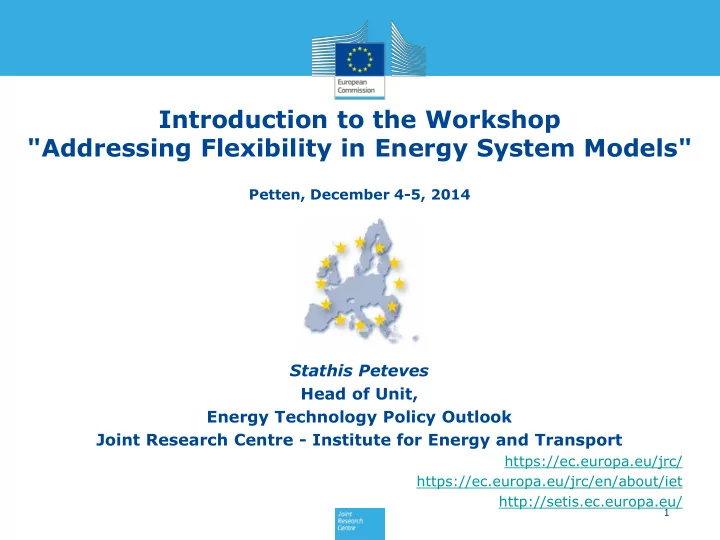

Introduction to the Workshop "Addressing Flexibility in Energy System Models" Petten, December 4-5, 2014 Stathis Peteves Head of Unit, Energy Technology Policy Outlook Joint Research Centre - Institute for Energy and Transport https://ec.europa.eu/jrc/ https://ec.europa.eu/jrc/en/about/iet http://setis.ec.europa.eu/ 1
Who we are? 2
The JRC inside the European Commission 28 Commission Members President Jean-Claude Juncker Commissioner Tibor Navracsics Education, Culture, Youth & Sport Director-General Vladimír Šucha Joint Research Centre 7 JRC Institutes Director Giovanni F. De Santi JRC Institute for Energy and Transport
Key scientific activities • Renewable energy • Sustainable and safe nuclear energy • Energy security, system and markets • Energy technologies modelling and assessment • Alternative fuels • Hydrogen and fuel cells • Sustainable transport • Energy efficiency
Energy Technology Policy Outlook Unit Mission Support the development and assess the impact of energy technology innovation on the transition to a low carbon society, in support of the energy, transport, industrial and innovation policies of the EU. Key activities Technology assessment (techno-socio-economics) • Modelling of technologies, sectors and the energy • system Reference technology databases • Monitoring of technological innovation and of various • sectors Themes Low-carbon technologies (CCS, wind, marine, geothermal, energy storage), energy intensive industry, e-mobility, critical materials, innovation capacities Policies Energy Technology, Research & Innovation, Industry, Transport, Eco-Innovation
The Workshop 6
Why flexibility as the ‘theme’ Future energy systems will be forced to become increasingly flexible in order to cope with the challenges of integrating higher shares of renewable energy sources Policy makers need to consider issues such as the effects of intermittent energy sources on the reliability and adequacy of the energy system, the impacts of rules governing the curtailment or storage of energy, or how much backup dispatchable capacity may be required to guarantee that energy demand is safely met How to address properly these issues in energy system models? 7
Goals of the Workshop: learn from each other To gather (the) experts from modelling teams currently dealing with these problems from different perspectives, ranging from energy system-wide to detailed sectoral energy models To openly share and compare modelling approaches and results To identify gaps and potential solutions, preferably in a broadly consensual way 8
Expected outcomes A JRC Technical report to be published in 2015: • based on your contributions -abstracts and slides, • with a summary of the discussions, & • a set of methodological recommendations for modelling flexibility ( to be reviewed and commented by all ) A possible follow-up? 9
Organization of the workshop Chatham house rules: free discussion! As informal as possible • 30-minute long presentations • Brief questions and answers during/after each presentation • Broader discussions at the end of each session • If time allows, additional presentations not foreseen in the • agenda! 10
Agenda December 4th 09:00 Introduction to the JRC-IET and the workshop (S. Peteves, IET) 09:30 Dec. 4 09:30 Review of flexibility-related issues in energy system models ( J. Dillon, 10:00 UCD and UCC ) 10:00 Model coupling across scales ( H. Heinrichs, Jülich ) Introduction to 10:30 flexibility issues and 10:30 Coffee break modelling-related 11:00 challenges 11:00 Challenges of representing electricity system flexibility in energy system 11:30 models ( V. Silva, EDF ) 11:30 Key challenges in our work on modelling future flexible energy systems ( F. 12:00 Martinsson, IVL ) 12:00 Discussion 13:00 13:00 Lunch break 14:00 14:00 Holistic approaches in addressing flexibility in energy system modelling (T. 14:30 Koljonen, VTT) 14:30 Coupling TIMES PanEU to E2M2s ( T. Kober, ECN ) 15:00 Addressing flexibility: 15:00 Coffee break 15:30 linking energy system models and sectoral 15:30 Coupling TIMES with power system models ( K. Poncelet, KUL ) energy models 16:00 16:00 Flexibility in JRC-EU-TIMES and DISPASET ( W. Nijs, A. Zucker, I. 16:30 Hidalgo, IET ) 16:30 Discussion 17:30 19:30 Dinner at Nero restaurant 21:30 11
Agenda December 5th 09:00 Renewable energy options and strategies in energy plans ( A. Miketa, 09:30 IRENA ) Dec. 5 09:30 Economic aspects of renewable energy sources ( L. Hirth, PIK ) 10:00 10:00 Simplified flexibility parameters for evaluating renewable integration ( P. 10:30 Denholm, NREL ) Modelling the integration of high 10:30 Coffee break shares of variable 11:00 renewable energy 11:00 Renewables and storage in ETP-TIMES ( U. Remme, IEA ) sources 11:30 Integrating renewable energies - estimating needs for flexibility, 11:30 competition of technologies and the impact of grid extensions ( F. 12:00 Borggrefe, DLR ) 12:00 Discussion 13:00 13:00 Lunch break 14:00 14:00 Modelling flexibility needs in the European power system with 14:30 DIMENSION and MORE ( A. Knaut, EWI ) 14:30 Storage, grid, and the cycling behaviour of thermal units: PERSEUS-NET- 15:00 ESS/TS ( S. Babrowski, KIT ) Modelling flexibility 15:00 Coffee break needs in power system 15:30 models Whole-system approach to assessing the value of flexible technologies and 15:30 products in supporting cost effective integration of renewables (G. Strbac, 16:00 ICL) 16:00 Use of residual load curves to study the high penetration of renewables in 16:30 TIMES-Greece ( G. Giannakidis, CRES ) 16:30 Closure Conclusions of the workshop 17:30 12
Thank you! The Commission's Strategic Energy Technologies Information System Please visit the SETIS website: http://setis.ec.europa.eu 13
Recommend
More recommend